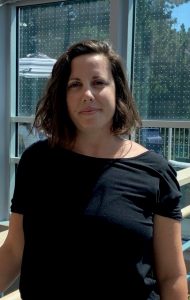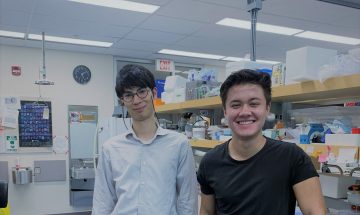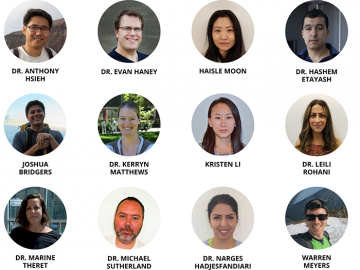
Dr. Marine Theret
For Research Associate Dr. Marine Theret, mentorship is all about giving and receiving good, constructive feedback. A long-time proponent of mentorship, Marine was awarded the Neil Mackenzie Mentorship Excellence Award during CBR-SBME Research Day 2021, to recognize her mentorship excellence and many contributions. The award is bestowed a Centre for Blood Research (CBR) member each year, and honours the memory of Dr. Neil Mackenzie, a postdoctoral fellow formerly in Dr. Dieter Brömme’s lab who was an outstanding mentor to his students and colleagues.
An avid hiker and gym enthusiast, Marine joined the Rossi Lab in 2016 to study fibrosis and its signalling pathways. Since then, her research has shifted to investigating mesenchymal stem cells and inflammation. By targeting certain pathways or factors, she seeks to understand how mesenchymal stem cells regulate inflammation in the body.
We spoke with Marine about the mentors who have impacted her own life, the importance of feedback, and what mentorship can teach young scientists about collaboration and communication.
How did you feel when you found out that you’d received the Neil Mackenzie Mentorship Excellence Award?
When I received the award email, I was working with my undergraduate student Lucas Rempel on his CBR-SBME Research Day presentation, so he got to see my surprise, excitement and live reaction!
This was just before my birthday, so I was joking with Lucas, saying he didn’t have to get me a present, because he and his fellow undergrad Joshua Hashimoto had already “gifted” me with the nomination and award. It was a very cute and funny moment.
How would you describe “good mentorship”?
I don’t think that people are born being “good” or “bad” at mentorship. It’s a professional relationship, where the mentor and the mentee are a pair. Each relationship is unique, because each person brings something different – whether that’s their knowledge level, background, or something else.
What qualities are important in your own mentorship?
1. Providing and receiving constructive feedback. For me, feedback is the most important, and should go both ways. I want my mentees to know what they did perfectly, what they did well, and what they need to focus on. After you’ve established mentorship goals at the beginning, feedback helps mentees continuously improve to meet those goals.
You have to let your mentees give you feedback, too, so they can tell you when they don’t understand something or need support. This helps you adapt your mentorship style to each mentee’s situation. It’s also important to let your mentees give feedback on your work. For example, since English is not my first language, I will ask my mentees to proofread my writing. Our learning is definitely two-way.
2. Expressing emotion. When the lab has a good day or something good happens in my life, I share it with my students. Even when things don’t go well, or when experiments don’t work out, it’s important for me to share that, too – to show that I care about everything, both the good and the bad.
“When the lab has a good day or something good happens in my life, I share it with my students. Even when things don’t go well, or when experiments don’t work out, it’s important for me to share that, too – to show that I care about everything, both the good and the bad.”
Tell me about a few mentors who have greatly influenced your own scientific journey.
During my undergrad in France, I met Dr. Laurence Dubreil while pursuing labwork for the first time. I was helping with immunostaining and she was performing microscopy, and we would spend hours in front of the confocal microscope, talking about the scientific world and our projects. During the first year of my Master’s, I actually chose to go back and help out in the lab where she worked, because we had connected so deeply.
That was my first great mentoring experience. Then, during the first year of my Master’s, Dr. Laurence Dubreil and Dr. Karl Rouger introduced me to the people who would eventually become my PhD instructors: Dr. Rémi Mounier and Dr. Bénédicte Chazaud. It goes to show how one mentoring connection can lead to many more.
Rémi and Bénédicte were amazing. They taught their graduate students everything, and showed us that science is not only what takes place at the bench, performing experiments or writing papers, but also what happens afterwards: fighting for a paper’s acceptance, fighting to hire people, fighting for funding. I’m very grateful that they shared those insights, which you need to know if you want to pursue a career in academia.

Lucas Rempel and Joshua Hashimoto
What’s your biggest challenge as a mentor?
Managing my stress. When I’m very stressed or have many deadlines, I start to get impatient, which is very bad for mentorship. Everyone experiences stress, of course, but you have to learn how to manage stressful days without putting that on your mentees’ shoulders. The more you know about yourself and managing stress, the better of a mentor you will be.
What would you say to younger scientists who want to get involved in mentorship?
The only way to become a better mentor is to actually practice mentorship and get feedback on your role. Sit down with your mentee regularly and give them space to tell you what went well, what didn’t go well, and what you can do better next time. Anonymous feedback surveys are great for this too.
Secondly, if your mentor-mentee relationship doesn’t work out, it doesn’t mean that you’re a bad mentor or mentee. Maybe the pairing wasn’t ideal, or your communication styles didn’t match up. Like any human relationship, mentorship will never be perfect, but you will learn from every experience.
“[Scientific mentorship] shows a mentee that, in order to do science, you need to be able to communicate and collaborate… We don’t do science for ourselves – we do it for common knowledge, with other people and for other people. I think that’s something that every mentor-mentee relationship should emphasize.”
Mentorship is valuable for many reasons, including support, skill building, and networking. Why is mentorship important in the sciences?
It shows a mentee that, in order to do science, you need to be able to communicate and collaborate.
Science is no longer a field where you can work by yourself in a tiny corner of the lab and end up as the single author of a paper. We don’t do science for ourselves – we do it for common knowledge, with other people and for other people. I think that’s something that every mentor-mentee relationship should emphasize.
Your favourite part of mentorship?
Something that I really enjoy – and missed during the pandemic – was seeing all the undergraduate students in my lab trying to teach each other the skills that their own mentors had taught them.
I remember one student who’d joined the lab with very little experience – he’s now teaching new students the techniques he’d learned! Watching students grow by interacting with each other is extremely fulfilling.

The nominees for the 2021 Neil Mackenzie Mentorship Excellence Award: Dr. Anthony Hsieh, Dr. Evan Haney, Haisle Moon, Dr. Hashem Etayash, Joshua Bridgers, Dr. Kerryn Matthews, Kristen Li, Dr. Leili Rohani, Dr. Marine Theret, Dr. Michael Sutherland, Dr. Narges Hadjesfandiari, and Warren Meyers. This year’s award recipient is Dr. Marine Theret.
Congratulations to Marine and all our award nominees! The CBR is incredibly fortunate to have mentors in our community who uplift their peers, share insights, and build a positive learning culture, inside and outside of the lab.
This year, we received nominations for 12 different mentors: Dr. Anthony Hsieh, Dr. Evan Haney, Haisle Moon, Dr. Hashem Etayash, Dr. Joshua Bridgers, Dr. Kerryn Matthews, Kristen Li, Dr. Leili Rohani, Dr. Marine Theret, Dr. Michael Sutherland, Dr. Narges Hadjesfandiari, and Warren Meyers.
Special thanks to everyone who took the time to write a nomination – we greatly appreciate the effort and thoughtfulness you took to recognize your mentors.
Dr. Neil Mackenzie was a postdoctoral fellow in Dr. Brömme’s lab at the CBR. Neil was a dedicated and caring mentor whose encouraging and motivating words and actions were sincerely appreciated by all those whom he touched – colleagues, friends, and students.
To honour his legacy and the impact he has made on the people within and outside the Centre for Blood Research, you can make a donation to the Neil Mackenzie in Memoriam Fund. Your donation will support the CBR mentorship initiatives, promoting mentorship excellence throughout our research community.


